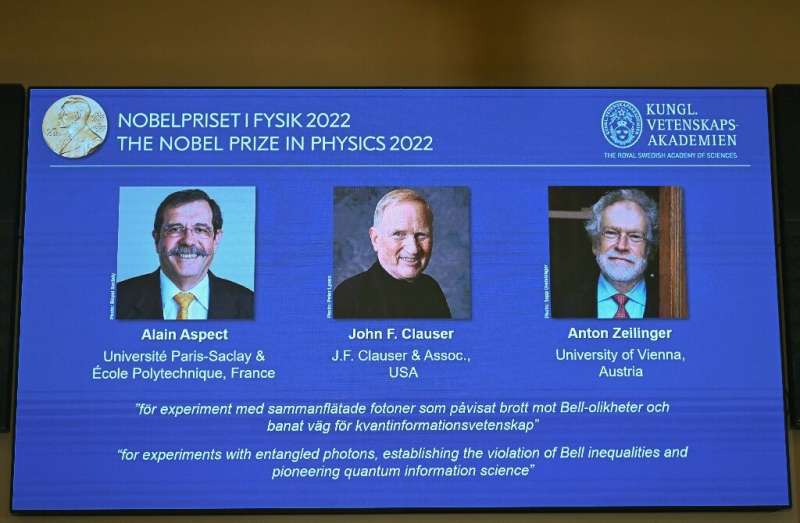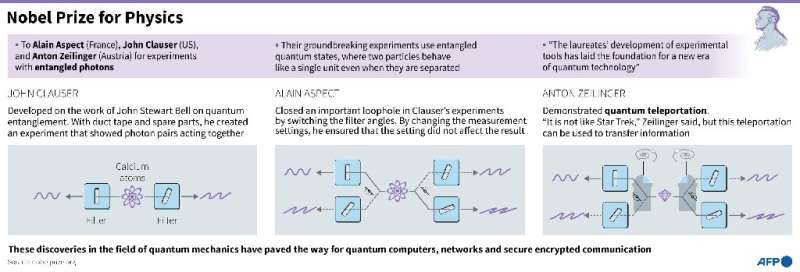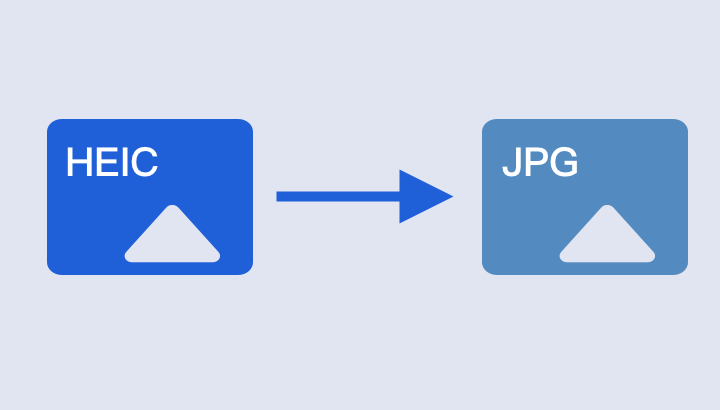Allen Aspect, one of three Nobel Prize laureates in physics, helped pave the way for what he calls the “second quantum revolution.”
Allen Aspect, who won the long-awaited Nobel Prize in Physics on Tuesdayaccording to former students and colleagues, not only helped prove the amazing theory of quantum entanglement, but also inspired an entire generation of physicists in his native France.
Quantum entanglement is a theory famously rejected by Albert Einstein, which states that when a particle is split into two, the properties of the two new particles remain connected as if by an invisible thread, no matter how far apart they are.
This remained a theory until Aspect and his team first proved the phenomenon in a laboratory experiment in 1981 by entangling two photons—units of light—at a distance of 12 meters (40 feet).
The experiment helped pave the way for what Aspect called the “second quantum revolution,” which led to a number of new technologies, including quantum computingencryption and more.
“Quantum weirdness has dominated my whole life as a physicist,” Aspect told AFP in 2010.
His experiment finally resolved a dispute that had lasted more than 60 years between Einstein and one of the fathers of quantum science. physicsNiels Bohr from Denmark.
Bohr believed quantum entanglement but Einstein, whose work helped predict this phenomenon, opposed it, calling it “terrible action at a distance.”
“Bohr wins from a certain point of view,” Aspect said in an interview released by the Nobel Foundation after his win on Tuesday.
“But Einstein wins because he noticed something unusual,” he added.

Aspect won the Nobel Prize in Physics together with the Austrian physicist Anton Zeilinger and John Clauser of the United States.
Aspect said he was proud to be on the same list of Nobel laureates who “completely changed physics.”
Awarded alongside Austrian physicist Anton Zeilinger and John Clauser of the US, Aspect stressed the importance of international scientific cooperation “at a time when the world is not so good and when nationalism is gaining ground in many countries”.
“The tireless teacher”
Aspect, the son of a teacher, was born in Augens in southwestern France in 1947.
He took second place in the physics exam in French education, and is currently a professor at the University of Paris-Saclays and Ecole Polytechnique. He is now 74 years old, married with two children.
Aspect has already won numerous awards including gold medal from the French research institute CNRS, and shared the 2010 Wolf Prize in Physics with Zeilinger and Klauser.
Aspect has been expected to win the Nobel Prize for years, with Chris Phillips, a physicist at Imperial College London, saying “the prize is long overdue.”
“This is one of the most well-deserved awards we’ve had in a while,” he added.
“We’ve all been waiting for this for a long time! We’re very proud,” said French Minister of Higher Education and Research Sylvie Reteillot, who has known Aspect since she was a physicist.

Discoveries of Nobel Prize laureates in physics.
“He’s one of those physics teachers. Today, there’s a whole community working under him,” said Reteillo, a former president of Paris-Saclays University.
Aspect is also a “tireless teacher” who delivers acclaimed lectures, she added.
Former student Georges-Olivier Raymond, who now heads French quantum processor startup Pasqal, said it was “fantastic” that Aspect had won the Nobel Prize.
“Everything I’ve done in my career is because of him,” Raymond said.
With his experiment, “Aspect accomplished a feat that surprised us all,” Raymond said. “It was so different from what we learned in school … it inspired generations of students.”
Raymond said he not only passes on his passion for physics to his students, but is also a “bon vivant” who will tell you all about his foie gras recipes.
“I can still hear him saying when I was only 20 years old … ‘you should build quantum startups, that’s the future,'” Raymond said.
– He was right.
© 2022 AFP
Citation: Alain Aspect, Nobel Laureate, Father of Quantum Entanglement (2022, October 4) Retrieved October 4, 2022, from https://phys.org/news/2022-10-alain-aspect-nobel-winning-father-quantum .html
This document is subject to copyright. Except in good faith for the purpose of private study or research, no part may be reproduced without written permission. The content is provided for informational purposes only.






